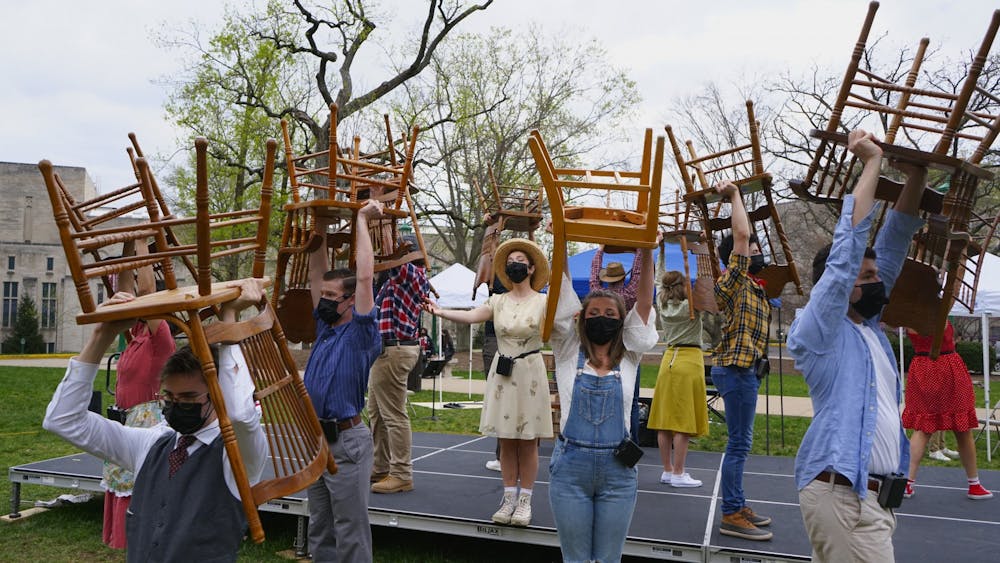Bloomington Delta Music Club was founded in October 2019. The group of 11 musicians played for only five months before the COVID-19 pandemic hit Bloomington. This year, they’ve managed to find their footing and work with the situation — but they’re still searching for the money to keep going.
“We’re a music club,” said co president Sam Boland. “That requires musical equipment. You can sound great as a musician, but if people can’t hear you, it doesn’t matter.”
They’re not alone in their financial need. Be it music, theater, dance or anything in between, the pandemic has left many student arts organizations looking for ways to adapt past in-person fundraisers such as donation-based performances, selling apparel and playing at fundraisers to a virtual world.
In the past, Bloomington Delta performed at other organizations’ fundraisers, where they would receive a percentage of the money earned. When the pandemic hit, these fundraisers stopped, leaving the group without a revenue source.
The musicians needed equipment to perform, Boland said. As their list of missing instruments continued to add up in the new school year, they tried new types of fundraisers. They increased their dues, Boland said, and began to perform in university-sponsored open-air shows.
Boland and co-President Elliott Obermaier said the virtual fundraiser that meant most to them was their Spotify launch fundraiser. For each dollar donated, the donor would be entered into a drawing where they could pick a song for the organization to cover on its Spotify page. The fundraiser ultimately raised more than $200.
“I think that was a moment when we realized that, yeah, it was a fun idea, but people do care about this,” Obermaier said. “They’re invested in our success moving forward.”
University Players had similar struggles. A student-run theater organization, the group is trying to maintain as much normalcy as possible. Where they’re finding difficulty is in keeping their performances safe, Financial Director Kabir Gandhi said.
To maintain IU’s COVID-19 protocol while performing, University Players purchased hand sanitizer, a thermometer and other safety measures. This allowed them to perform and have other outdoor fundraisers, but also meant they had to spend the money they did raise on safety precautions rather than their performances.
“There has been a little bit of that fiscal cost to making sure that our events are safe,” Gandhi said. “That the students who are running it, performing in it, and attending it are too.”
Movement Cooperative, a dance organization that provides students the opportunity to take classes and choreograph dances, has taken a different route, instead focusing on involvement and outreach.
Unlike Bloomington Delta and University Players, Movement Cooperative’s events are mostly volunteer-based, Treasurer Chelsea Kummeth said. The dance group often partners with volunteer teachers to give its members access to classes.
“It was different than other organizations, where fundraising is the main focus,” Kummeth said. “The goal this year was to just encourage people to attend and to provide a community for all people to come in and move and enjoy spending time with each other.”
Movement Cooperative is considering fundraising to bring in teachers from further away in the future. They’ve considered selling apparel or putting on a donation-based performance, Kummeth said.
Gandhi predicts University Players won’t go back to normal next semester, and that they’re likely going to have to continue solely outdoor fundraisers.
“We just want to provide opportunities,” Gandhi said. “And, unfortunately, opportunities like producing full-scale shows with the costumes, sets and props, it does cost money.”
Bloomington Delta said that they’ve learned a lot from the changes they’ve made for the pandemic. While they miss the house shows they used to play, being forced to slow down has helped them to grow their organization and make it stronger, the co-presidents said.
“I’m very thankful that the club survived it and that we’re thriving through it,” said Boland. “The pandemic kind of forced us to take stock in what we have and how we manage it as opposed to just doing as it came along, which I’m thankful for.”
CORRECTION: A previous version of this article misspelled the name of Movement Cooperative.




